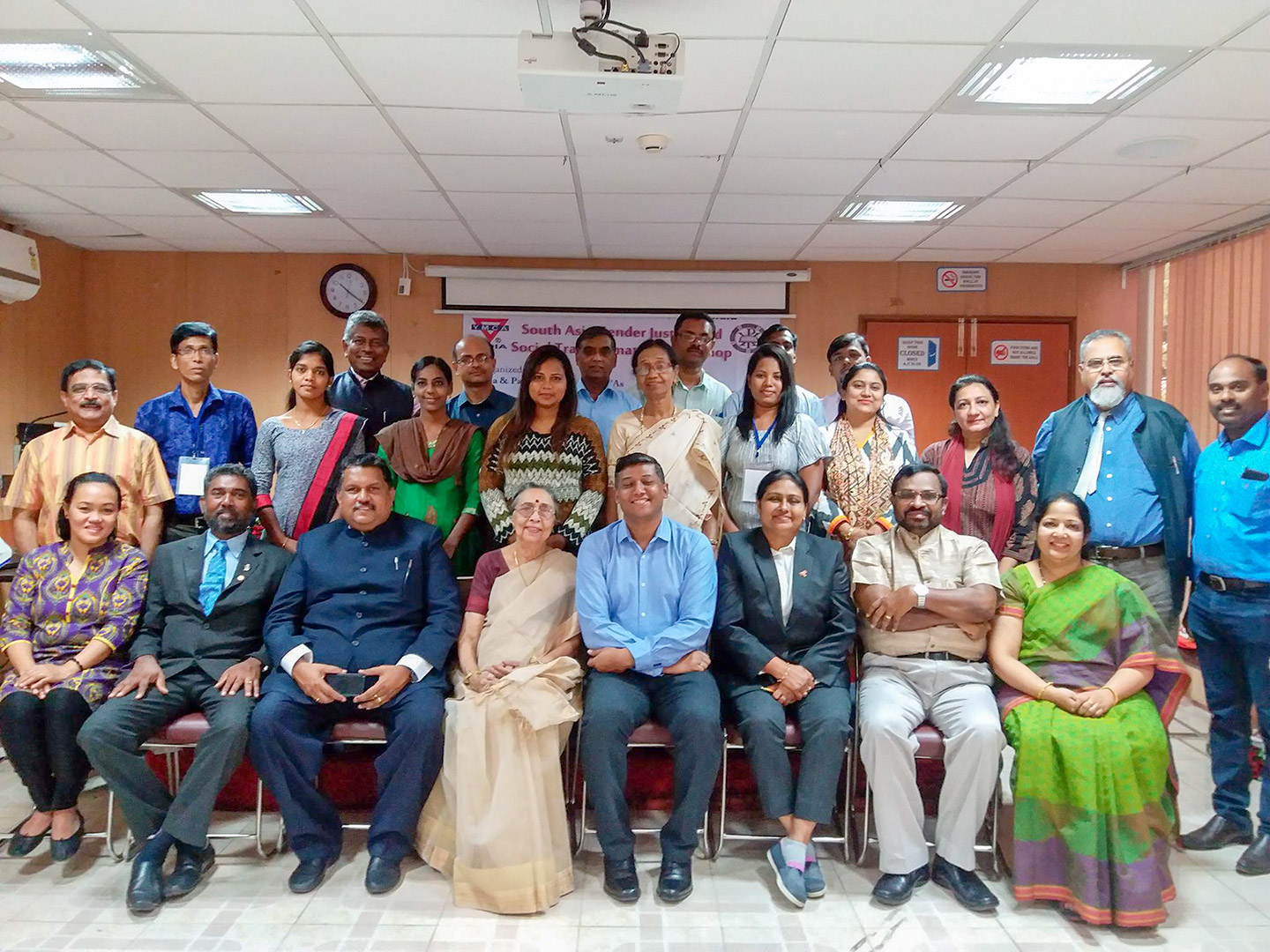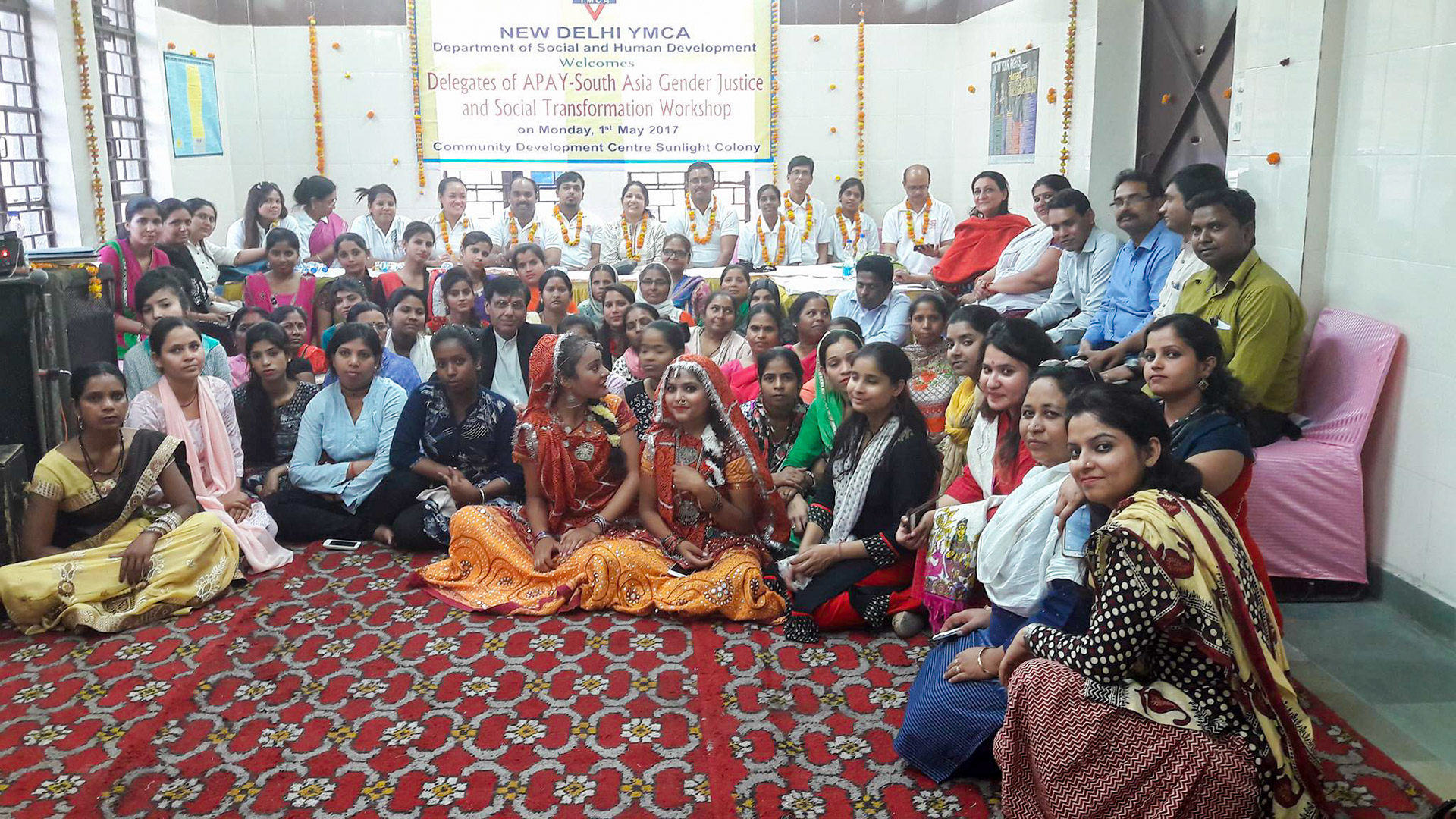Gender Justice
YMCA is a world-wide Christian, ecumenical, voluntary movement for women and men with special emphasis on the genuine involvement of young people. It seeks to share the Christian ideal of building a human community of justice with love, peace and reconciliation for the fullness of life for all creation.
Each member YMCA is therefore called to focus on certain challenges which will be prioritised according to its own contexts- that includes:
• Empowering all, especially young people and women to take increased responsibilities and assume leadership at all levels and working towards an equitable society.
• Advocating for and promoting the rights of women and upholding the rights of children
(Excerpts from Challenge 21)
The APAY adheres to the guiding principle of Challenge 21; hence commitment for the Gender Justice remains an integral part and a mandate in the YMCA, especially in the Asia and Pacific region. APAY initiates the promotion of Gender Equity in all levels with a community-specific approach. It affirms that the quest for the elimination of discrimination of gender-based violence and promotion of an inclusive society requires a collaborative undertaking irrespective of sex and gender. The YMCAs will continue to establish an inclusive environment by creating awareness and policies that promote and reflect gender justice and develop a mechanism that addresses gender issues, including sexual harassment. Through the Gender Justice initiatives, APAY increases dialogue and discussions on various perspectives, including the non-binary perspectives of gender.
Gender Justice is one of the main focus of the Quadrennial Program Plan (QPP) of the APAY with the following objectives:
- To cultivate a culture of gender equity and empowerment of women and girls at all levels through the creation of platforms of learning, reflection and exchanges of experiences
- To ensure the development of leadership skills, organizing and advocacy capacities of YMCA constituencies that promote reforms for equal opportunities for all at all levels
YMCA is a world-wide Christian, ecumenical, voluntary movement for women and men with special emphasis on the genuine involvement of young people. It seeks to share the Christian ideal of building a human community of justice with love, peace and reconciliation for the fullness of life for all creation.
Each member YMCA is therefore called to focus on certain challenges which will be prioritised according to its own contexts- that includes:
• Empowering all, especially young people and women to take increased responsibilities and assume leadership at all levels and working towards an equitable society.
• Advocating for and promoting the rights of women and upholding the rights of children
(Excerpts from Challenge 21)
The APAY adheres to the guiding principle of Challenge 21; hence commitment for the Gender Justice remains an integral part and a mandate in the YMCA, especially in the Asia and Pacific region. APAY initiates the promotion of Gender Equity in all levels with a community-specific approach. It affirms that the quest for the elimination of discrimination of gender-based violence and promotion of an inclusive society requires a collaborative undertaking irrespective of sex and gender. The YMCAs will continue to establish an inclusive environment by creating awareness and policies that promote and reflect gender justice and develop a mechanism that addresses gender issues, including sexual harassment. Through the Gender Justice initiatives, APAY increases dialogue and discussions on various perspectives, including the non-binary perspectives of gender.
Gender Justice is one of the main focus of the Quadrennial Program Plan (QPP) of the APAY with the following objectives:
1 To cultivate a culture of gender equity and empowerment of women and girls at all levels through the creation of platforms of learning, reflection and exchanges of experiences
2 To ensure the development of leadership skills, organizing and advocacy capacities of YMCA constituencies that promote reforms for equal opportunities for all at all levels
East Asia Gender Justice and Social Transformation Workshop
Last Updated (Saturday, 08 July 2017 12:56)
The three-day East Asia Gender Justice and Social Transformation Workshop was participated by twelve staff and lay leaders both young and senior members of YMCAs of Hong Kong, Japan, Korea, Macau, Taiwan and Australia. The group that met on June 7-11, 2017 at Salisbury YMCA in Hong Kong strongly believes that the YMCAs in the region are not “gender blind.” However, the level of awareness and actions engaged in by the various movements in relation to advancing the rights of women and other sexual minorities need to keep moving forward. Thus, the concluding call for action is to continuously and consciously educate, organize and mobilize local and national movements to work together towards developing communities through their programs in which no one particularly women and other sexual minorities are excluded, marginalized or discriminated against because of their gender.
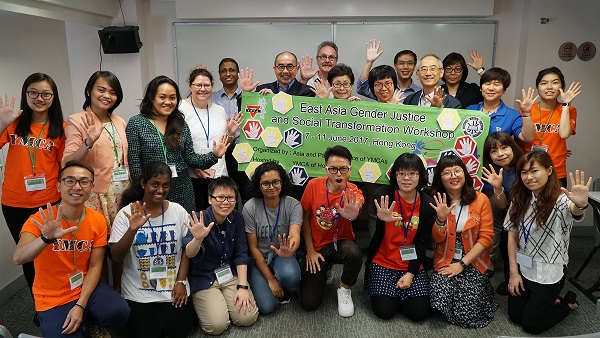
|
Way Forward Recommendations: • use of gender neutral/sensitiv language • conduct gender sensitivity workshop among staff and lay leader • conduct of cross generation training • accelerate formation and strengthening of gender justice committee on the national level • strengthen networking and partnership • Inclusion of other sexual minorities in programming • Collect data base on Gender-work in the Region • Publication of resource materials on gender justice • Expand advocacy on social media |
Read more: East Asia Gender Justice and Social Transformation Workshop
South Asia Gender Justice and Social Transformation
Last Updated (Thursday, 11 May 2017 12:11)
Gender. Sex. Justice. Transformation. Understanding of these key concepts and doing practical actions to achieve gender justice both on personal and organizational level are highlighted by the 14 staff and lay leader participants from Bangladesh, India and Sri Lanka as their take away learning from the recently concluded APAY South Asia Gender Justice and Social Transformation Workshop held in New Delhi, India last April 29- May 3, 2017 with the National Council of YMCAs of India as the local host.
The three-day workshop that was inaugurated by APAY President Babu Markus Gomez, APAY Committee on Gender Equity Vice Chairperson Kumari Kuriakisoe, NCY India President Dr. Lebi Philip Mathews, NCY India NGS Ch. R.P. Manikumar, Keynote Speaker Dr. Jyotsna Chatterji along other guests emphasized the importance of working together, as a movement, towards developing communities in which no one particularly women and other sexual minorities are excluded, marginalized or discriminated against because of their gender. As part of a wider social movement working for social transformation, the regional movement has the responsibility to promote the protection of a person’s rights.
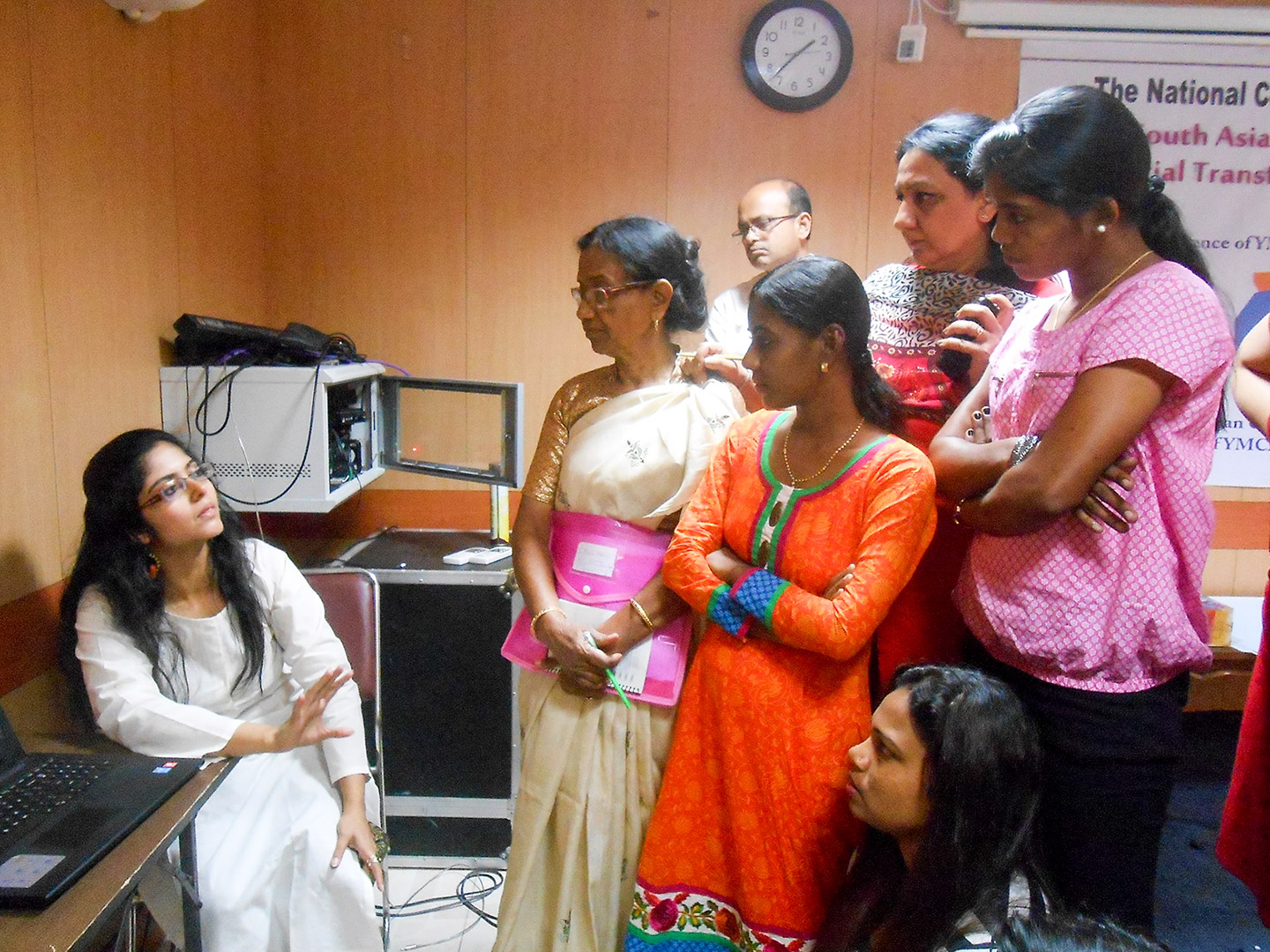 The keynote speech of Dr. Jyotsna Chatterji, Founder & Secretary–Joint Women’s Programme and the various workshop sessions and input presentations of other resource persons such as Aanchal Kapur and Anandana Kapur stressed that stereotype identities and roles played by women and men are mere social constructs. And that the gender relations that existed within the families, communities, churches, government, organizations and institutions undeniably perpetuate conformity to the norms imposed by patriarchal system.
The keynote speech of Dr. Jyotsna Chatterji, Founder & Secretary–Joint Women’s Programme and the various workshop sessions and input presentations of other resource persons such as Aanchal Kapur and Anandana Kapur stressed that stereotype identities and roles played by women and men are mere social constructs. And that the gender relations that existed within the families, communities, churches, government, organizations and institutions undeniably perpetuate conformity to the norms imposed by patriarchal system.
Actual experience of women under such circumstances was witnessed by the participants during the exposure visits to the YMCA of New Delhi program on children, girls and women in the slum areas. The program includes day care centers for children whose mothers are working and livelihood trainings for girls and women in communities. With the knowledge and community exposure, the participants were challenged to transform their mindsets, values and practices that internalize the idea that women are inferior to men. More importantly, it was collectively expressed that YMCAs in their context still has a long way to go to achieve gender justice. Thus, the participants proposed the involvement of more men in education and capacity building in order to facilitate organizational and societal transformation.
Read more: South Asia Gender Justice and Social Transformation
East Asia Workshop on Gender Justice and Social Transformation
Last Updated (Wednesday, 10 May 2017 17:42)
Hong Kong: 7 -11 June 2017
Introduction
Manifestations of gender injustices were identified by various constituents of the movement. The individual stories of injustices presented in different regional, national and local platforms form part and parcel of the lived experiences on discrimination and subordination of women and girls. These manifestations of gender injustices are evidently a violation of the fundamental human rights. After all, the call for gender justice is the call for basic right. It counters, as expressed in the UN Declaration of Human Rights, the global recognition of the inherent dignity and of the equal and inalienable rights of all members of the human family as the foundation of freedom, justice and peace in the world. More importantly, these gender-biased traditions and practices undermine the core of our Christian ideal of equality and justice for all of God’s creation.
As expressed in Challenge 21, each YMCA member is called to build a human community of justice with love, peace and reconciliation for the fullness of life for all creation. We are called to specifically empower all, especially young people and women to take increased responsibilities and assume leadership at all levels and working towards an equitable society; and to advocate for and promote the rights of women and upholding the rights of children.
Following therefore the mandate of Challenge 21, this quadrennial envisions working together, as a movement, towards developing communities in which no one particularly women and other sexual minorities are excluded, marginalized or discriminated against because of their gender. As part of a wider social movement working for social transformation, the regional movement has the responsibility to promote the protection of a person’s rights.
With the end in view of realizing the vision for gender justice, the regional office will conduct series of sub-regional workshops that aims to empower women and men to work towards achieving gender justice and developing equitable society.
Read more: East Asia Workshop on Gender Justice and Social Transformation
Stand for Someone’s Rights Today
Last Updated (Friday, 09 December 2016 15:09)
Human Rights Day 2016
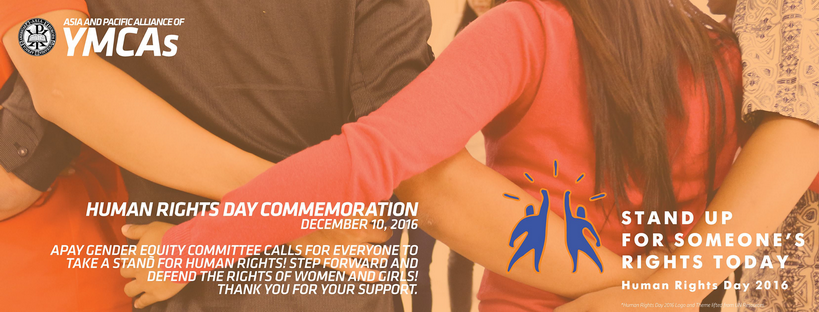
The Advance Training of Trainers in Gender Mainstreaming, June 3-10, 2013
Last Updated (Wednesday, 11 September 2013 17:00)
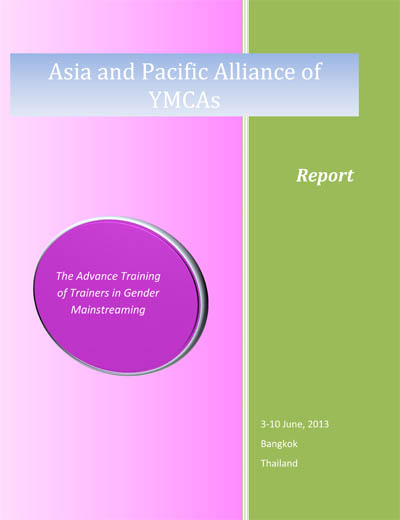
I. Introduction:
As earlier shared, after long years of attempts and efforts to advance our responses and achieve positive change in gender mainstreaming towards social change through the YMCA work, the eighteen (18) participants including resource persons to the Advance Training of Trainers in Gender Mainstreaming from seven (7) national and local movements including Bangladesh, India, Indonesia, Japan, Philippines, Sri Lanka and Thailand, realized that YMCAs need to strive harder in their quest towards their gender mainstreaming goals. Following the initial Gender Mainstreaming training held in Jakarta in November 2012, this follow-up training was conducted on 3-10 June 2013 in Bangkok, Thailand. The need to further the YMCAs’ initiatives and responses in integrating gender mainstreaming process into the overall work of the movement is in itself a strengthening aspect as both women and men could become decision makers to sustain growth and development of the movement.
As has been written, shared and discussed in some platforms, “gender equality is the goal of gender mainstreaming. It requires integration of gender equality concerns into every aspect of the development process, including governance of an organization. It is a powerful tool for social change because it takes into account and responds to the intersections of power, wealth, knowledge, capabilities and rights in creating and sustaining gender inequality. It has been noted that YMCA, after 25 long years or more of taking this issue-based APAY thrust, has not gained much experience that can be shared as part of a strategic and specific action plans. Though it recognized this leadership initiatives to include it in the strategic goals, we know that in practice, there are no effective and tested strategies to help achieve institutional and social change in our respective movements and through response programs in communities we work with.
Read more: The Advance Training of Trainers in Gender Mainstreaming, June 3-10, 2013
Read more...
Page 6 of 8






